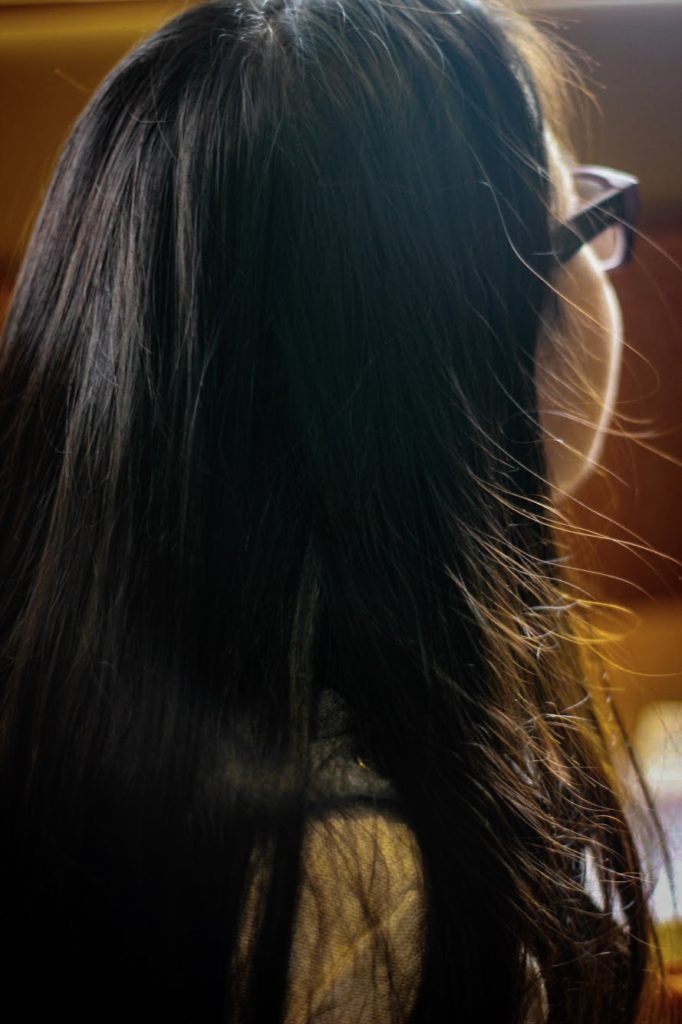A photo of Elyse Ohlinger taken with the sunlight. Photo by Jennahba Montgomery.
Montgomery: Tell me about your backstory.
Ohlinger: My name is Elyse Ohlinger. I was born in China. I lived in an orphanage with a bunch of other orphans. I got adopted by the age of twelve, and I came to America. Life here in the U.S. is much better than my life back in China, because my orphanage was really poor. We had a lot more kids then there was staff, and we didn’t have the money to take care of all the kids. Sometimes, they had to tell kids to leave the orphanage. From the orphanage I came from, if you reach the age of seventeen, they kick you out with no money, no food, no way to support yourself. Stuff like that; that’s my backstory.
Jennehba: How has your past shaped you into the person you are today?
Elyse: Well, when I was an orphan, I was very shy. I wasn’t confident at all. I hated everyone. I had a best friend, but she got adopted before me. I felt like she just kind of left me in the orphanage all by myself, because she and I, we did everything together. There was no family love there. People who worked there were just there to take care of you for the money, and because of that, I was very self conscious. I didn’t have love in myself. I looked down on myself a lot. When I came here, my family helped me a lot. They helped to be confident. Don’t let people judge you. People are going to judge you. You can’t stop that, and you just gotta love yourself before you love other people. I’m more confident, verses when I was in China, because nobody taught me that you need to stand up for yourself.
Jennehba: You live in a white household, right? There are probably very big cultural differences.
Elyse: There is. My family is mainly caucasian. I do have another adopted brother. He’s asian too. We do eat Chinese food, like dumplings. We have decorations that chinese people put up in their homes. I mean, we could do a lot more. My parents don’t know anything about Chinese culture, so it’s hard for them to celebrate it. Like for me, I don’t know all of my Chinese culture because I grew up in an orphanage where we didn’t celebrate any traditions that Chinese families do. I don’t feel like my Chinese culture is being misrepresented in my family because my family tries everything. They include me, and we do celebrate both cultures: the American culture and the Chinese culture. I am aware of my Asianess as an American.
Jennehba: So, you’re a Goah Scholar right? What do you think it means to be a Goah Scholar on this campus?
Elyse: Well, the whole purpose of the Goah Scholar is obviously to increase diversity. I don’t think that it’s met the goal of informing the other non-Goah students who come here. A lot of people I’ve met that aren’t Goah have no idea what Goah is, so I have to explain it to them. Obviously, I can see diversity on campus, but I feel like we live in two communities. One with no Goahs and one with Goahs, and then we just keep to ourselves. Like in the cafeteria, I’ve noticed that people who are Goah scholars sit on the booth side. People who aren’t Goah’s tend to sit on the right side.
Jennehba: Do you think there’s a way to get people together more?
Elyse: There is, but it’s going to be time consuming. It’s not something that is going to happen overnight. I mean, we could do a lot more campus involvement, but since we’re not well known, we should have a motivation for people. Like if you come to this, you get two SFP credits. Some people know about us, but they don’t really understand that the Goah Scholarship is more than giving out free money to people.That’s my problem here.
Jennehba: So, going back to your household. Do you speak Chinese there?
Elyse: No, but I’m learning Chinese right now. When I came here, I spoke Chinese perfectly. But since I was too busy speaking English, my brain kinda lost the language. So, now I’m trying to like relearn it, because it’s part of me that I don’t want to get lost again.
Jennehba: Is there anything you would like to tell anyone who’s reading this?
Elyse: Embrace your culture. Let’s say you come from India, and then you go to school somewhere in the U.S. Obviously, you’re living in a different culture. Just still be yourself. Like, if you have a way of dressing yourself, don’t dress according to how the people dress where you go to college. If people judge, let them judge. If they want to say something mean, then they’re going to say it. You could say something back or just embrace your culture. Don’t let people take that away from you, because that’s you. I’m sure they wouldn’t like it if someone took their culture away.
Jennehba: Being at Milligan, what is one thing that you want to get out of it?
Elyse: I guess the sense of belonging because my goal is for my children to come here because I really like Milligan, despite the lack of diversity and the two separate communities I’ve talked about before. Milligan made the cost of attending college possible. I’ve made friendships here that I hope to last beyond graduation even if we don’t live in the same states. I’ve gotten close to a couple professors. I have a lot of good memories here. They’re not like physical things I could see, they’re like internal feelings and thoughts and memories that I have. I hope they will leave with me when I leave Milligan.

